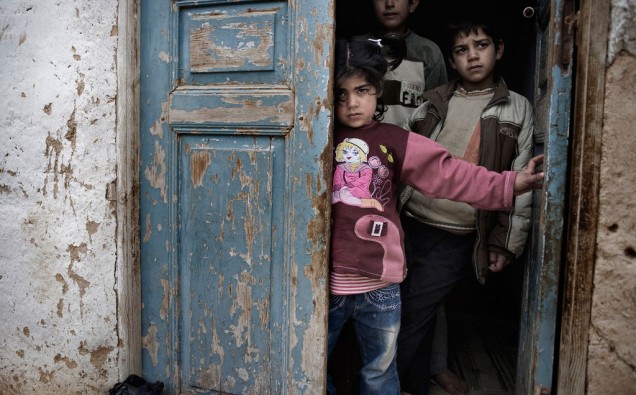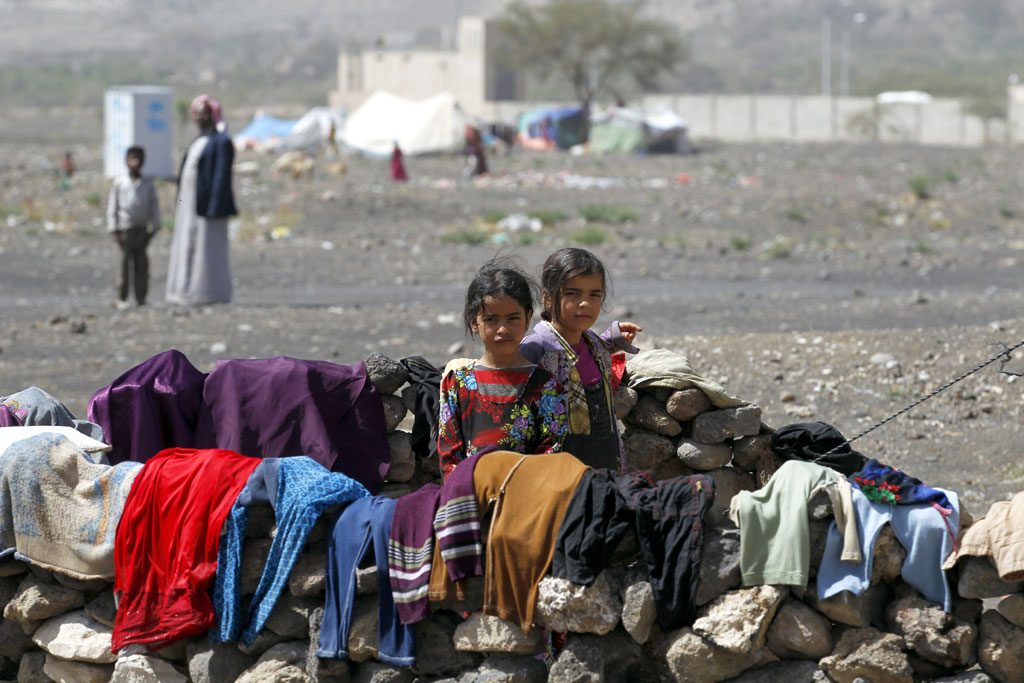
Syrian Children taking refuge behind a door – Photo Courtesy UNUCEF
Since the end of World War II, international diplomatic forums have been advocating a strong case for human rights for all. Yet, seven decades after the adoption of the landmark Universal Declaration of Human Rights, the world has not witnessed flagrant violations of human rights at the scale and pace that we have seen in the last few years.
Large populations in the Middle East and Africa have lost all they had in the deadly conflicts, terrorist attacks and hegemonic wars perpetrated by powerful countries against the weak.
Even disregard for modern challenges like climate change and resulting calamities on vulnerable lands undercut the principle of equal rights for all. Marking the human rights declaration is, therefore, calls for a moment of reflection at multiple levels.
As the United Nations plans to honor the 70th anniversary of the adoption of the Human Rights Declaration, the world powers need to find out ways to help make the world a peaceful place. The Muslim countries that have long denied democratic rights to their own people, minorities and women need to introspect and think ways out of the dire straits they are stuck in.
It’s true that the United States and other powers have on several occasions staved off catastrophic conflicts as in the case of Pakistan-India tensions in recent decades. But the fires engulfing the Middle East raise serious questions about the efficacy of the world diplomatic forums like the United Nations and the influence of major capitals.
The Middle East watchers know that the conflicts in Syria, Iraq and Yemen could have been averted at best and the loss of life and human dignity minimized at the very least. Similarly, in Asia, Indian and Myanmar state repression of Kashmiris and Rohingyas respectively could have been stopped. But that never happened and terror groups like the ISIS and states backing militant groups have been playing havoc with minority communities and nations in the Middle East. The Saudi-Iranian rivalry has further hurt the cause of ensuring human rights of minorities.

Eleanor Roosevelt of the United States holding a Declaration of Human Rights poster in English. (November 1949). UN Photo
Imagine, what could have happened in the absence of these wars and conflicts. The world leaders could have worked out a comprehensive approach to confronting the menace of terrorism. Afghanistan – which al-Qaeda used as a base to perpetrate the 9/11 terror attacks – could have achieved some stability through a multi-faceted but unified front against terrorism. But that has not happened.
What has happened is that the inapt international reaction to Arab Spring conflicts have diverted attention away from counterterrorism for several years now. The unchecked reigns of state repression gave rise to the ISIS in Iraq and Syria and emboldened states in the Middle East to back militant groups. The predicament has also allowed militant groups to exploit public grievances and amplify their violent narratives.
Clearly, the international system has much to answer for. Already, appeasement of influential nations on the issue of disregard for human rights has set back the clock on realizing the goal of human rights for all.
On Sunday, when the UN launches a campaign in Paris to honor the key human rights document, the world body has something to take solace from. But it has much more to reflect about on the Human Rights Day, which is observed annually on December 10.
Thankfully, the UN leaders are candidly acknowledging the need to realize human rights for all.
On the eve of the Day, Secretary-General António Guterres noted that while human rights abuses did not end when the Universal Declaration was adopted in 1948, the instrument has helped countless people to gain greater freedom and security.
He says the document has also helped to prevent violations, obtain justice for wrongs, and strengthen national and international human rights laws and safeguards.
“Despite these advances, the fundamental principles of the Universal Declaration are being tested in all regions,” he said, referring to rising hostility towards human rights and those who defend them by people who want to profit from exploitation and division.
“We see hatred, intolerance, atrocities and other crimes. These actions imperil us all,” Guterres said, according to a UN statement.
UN High Commissioner for Human Rights Zeid Ra’ad Al Hussein has also been circumspect.
Thanks to the Universal Declaration, he says, the daily life of millions has been improved, untold human suffering has been prevented and the foundations for a more just world have been laid.
“While its promise is yet to be fulfilled, the very fact that it has stood the test of time is testament to the enduring universality of its perennial values of equality, justice and human dignity,” he said.
Despite having achieved some diplomatic successes and stopped bloodshed and destruction in various parts of the world, not all is in the hands of UN diplomats.
It is the major countries and their leaders that have to act to safeguard rights for all in the globalized world. At the same time, the world has to avoid steps that inflame tensions.
For example, several former American diplomats and analysts have pointed out that the recent U.S. decision to recognize Jerusalem as capital of Israel was an unnecessary move that angered Palestinians, has set off violent clashes and its repercussions could inflict further harm on all sides of the ME conflict.
In his message, UN Secretary General Guterres makes this significant point when he urges “people and leaders everywhere to stand up” for all human rights – civil, political, economic, social and cultural – and for the values that underpin hopes for a “fairer, safer and better world for all.”
Come December 10, 2018 – the 70th anniversary of the UN Declaration of Human Rights – will the world have acted to stop ongoing conflicts, and safeguarded human rights of millions of people?


















